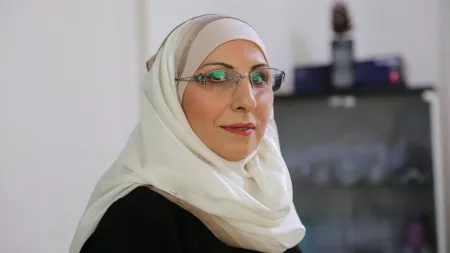Each year, on June 20, the world celebrates the strength and courage of people like Kholoud who have been forced to flee their homes to escape conflict or persecution. But what is “home” really? And how do people who have been forced to leave their homes create new ones?
Originally from Deir ez-Zor Governorate, Kholoud has been displaced multiple times. First to the city of Al-Hasakah, then to Deir ez-Zor, and then to Damascus, only to leave for Türkiye, the “home” of more than 3.5 million refugees.
When will that be? Only God knows, but surely one day I will return
“Every night before I go to sleep, I think about how much I want to return to my country, Syria. When will that be? Only God knows, but surely one day I will return,” says Kholoud, sitting in the living room of her home in Türkiye, where she has been living for the past eight years.
What is home?
“I love reading books in Arabic. Every once in a while, I buy a book to read, and at the same time, I listen to music from the Arab heritage. I listen to Arabic songs, and that makes my soul feel happy. Home is the place where I was born and raised, but it is also so much more than that. Recreating the sense of home here, in Türkiye, gives me a feeling of security, stability, and psychological comfort. Home means belonging and not forgetting my cultural identity and my country’s history.”
Home is the place where I was born and raised, but it is also so much more than that.
Kholoud is the mother of two boys aged 15 and 16. Her children have spent more than half of their lives as refugees. “When we left home for other cities, we were forced to live with many other families in the same shelter. The same happened when we reached Türkiye.”
When she talks about what she misses the most her eyes are wide open, as if her memories are appearing for real right in front of her.
Home means belonging and not forgetting my cultural identity and my country’s history.
Losing Relations
“I always think about the family members and the friendships we lost because we were on the move. I miss the evenings during which we used to sit together. I miss the Euphrates River. I often think about this bridge I had to cross to go to work. Every time I walked on this bridge, I closed my eyes because I was afraid. It was hanging on strong ropes, and it was not fixed on concrete."
I always think about the family members and the friendships we lost because we were on the move.
"The distance was long, so I closed my eyes and walked quickly, and at the end of it, there was a very beautiful garden”, says Kholoud.
To leave a house behind
“Of course, I also still think about the house that I left behind. To this day, I still see the door of my house in my dreams. I even miss my children's toys! When the war broke out, our hopes and dreams collapsed. My children's toys were lost. When we first moved to Türkiye, I felt bitter when my children saw a toy and asked me to buy it.
To this day, I still see the door of my house in my dreams. I even miss my children's toys!
“What makes me feel most at home today is the television because I play Arabic-language channels. Speaking Arabic at home is very important. I feel like I am still in my homeland. Back home when I put my head on the pillow to sleep, I felt safe. Here, I do not feel safe and stable.”
No choice of freedom
Kholoud explains that the psychological pressure, the economic hardships and being away from family and friends make life as a refugee very difficult.
I feel like we are trapped here; we do not have the freedom to move to see family members even though we live in the same country
“Just to give you an example, I cannot visit my sister who lives in Istanbul because of the restrictions of movement imposed on refugees who are under temporary protection. The same applies to my brother, who lives in Alanya. This makes me so sad, and I feel like we are trapped here; we do not have the freedom to move to see family members even though we live in the same country.”
A message of hope
Listen to me. Tomorrow will be more beautiful, we will recover, we will all cooperate, and the future ahead of us is bright.
“But despite the difficulties, today, I want to send a message to my children first but also everyone else who will read this. Listen to me. Tomorrow will be more beautiful, we will recover, we will all cooperate, and the future ahead of us is bright. We can challenge the difficulties and the hard reality of the war; we can do it. Just remember that the future is still ahead of us. We can still succeed, and with our lives, we will tell the whole world that we, the Syrians, made it and we are still here. And that applies to all refugees out there."
We can still succeed, and with our lives, we will tell the whole world that we, the Syrians, made it and we are still here. And that applies to all refugees out there.
Kholoud is a community activator with CARE. Through a project funded by the government of the USA, she volunteers with CARE to raise awareness and inform her community about women's rights, the risks of child labour and early marriage, and influence her community members to ensure the continuous education of their children.
